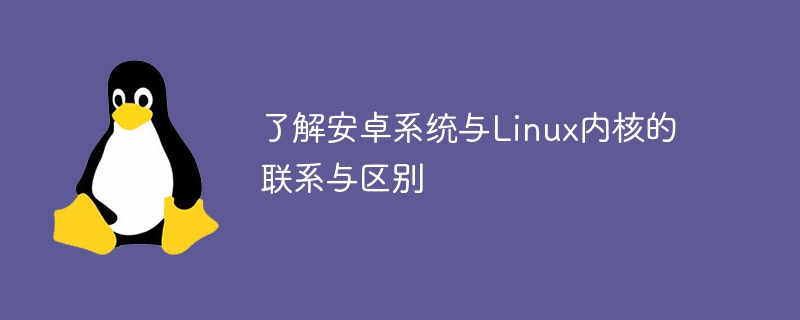

Title: In-depth exploration of the connection and difference between Android system and Linux kernel
As one of the mobile operating systems with the largest number of users in the world, Android system uses The Linux kernel. In the Android system, the Linux kernel plays an important role, responsible for managing hardware resources, providing system stability and security support and other functions. This article will delve into the connections and differences between the Android system and the Linux kernel, and explain the relationship between the two through specific code examples.
1. Contact:
1.1 Common basis:
Both the Android system and the Linux kernel have the characteristics of open source, and are maintained and improved by developers around the world. The Android system has undergone secondary development based on the Linux kernel, adding more functional modules and services, such as application frameworks, interface systems, etc., to meet the needs of mobile devices.
1.2 Resource Management:
As the underlying core of the Android system, the Linux kernel is responsible for managing hardware resources, including processors, memory, networks and other devices. The Android system uses the rich interfaces provided by the Linux kernel to access and control hardware resources, thereby ensuring that applications can run normally.
1.3 Security:
The Linux kernel has high reliability in terms of security and can provide security mechanisms such as file permissions and process isolation. On this basis, the Android system further strengthens user rights management, application sandbox and other security measures to ensure system stability and data security.
2. Differences:
2.1 Application layer differences:
Compared with the traditional Linux system, the Android system pays more attention to the user experience and application ecology of mobile devices, so in A lot of improvements and optimizations have been made on the application layer. The Android system uses its own application framework and interface system, which is quite different from the traditional Linux system.
2.2 Kernel customization:
The Android system has customized the Linux kernel and added many specific functions for mobile devices, such as battery management, camera support, etc. These customized functions make the Android system more suitable for the needs of mobile devices, different from the traditional Linux system.
2.3 Release cycle:
The release cycles of the Android system and the Linux kernel are also different. Android usually releases a new major version every year, while the Linux kernel is updated and released more frequently to adapt to different hardware platforms and needs.
3. Code example:
In order to better understand the connection between the Android system and the Linux kernel, the following is a simple code example that demonstrates the process of calling Linux system calls in an Android application. :
// 在安卓应用中通过JNI调用Linux系统调用 public class MainActivity extends Activity { static { System.loadLibrary("native-lib"); } public native void helloWorld(); @Override protected void onCreate(Bundle savedInstanceState) { super.onCreate(savedInstanceState); setContentView(R.layout.activity_main); helloWorld(); } }
// C代码实现调用Linux系统调用 #include#include #include JNIEXPORT void JNICALL Java_com_example_MainActivity_helloWorld(JNIEnv *env, jobject obj) { printf("Hello World from Linux kernel! "); // 调用Linux系统调用 int ret = syscall(SYS_getpid); printf("My process ID is %d ", ret); }
Through the above code example, we can see that the C code is called through JNI in the Android application, and then the Linux system call is called. This demonstrates the connection between the Android system and the Linux kernel, as well as the collaboration and integration between the two.
To sum up, there are close connections and certain differences between the Android system and the Linux kernel. The two cooperate with each other to form the basic system of Android devices. Through continuous learning and research, we can gain a deeper understanding of the relationship between the two and provide more ideas and methods for mobile application development and system optimization.
The above is the detailed content of Understand the connection and difference between Android system and Linux kernel. For more information, please follow other related articles on the PHP Chinese website!
 Which company does Android system belong to?
Which company does Android system belong to? What are the common secondary developments in PHP?
What are the common secondary developments in PHP? The difference between Hongmeng system and Android system
The difference between Hongmeng system and Android system Can data between Hongmeng system and Android system be interoperable?
Can data between Hongmeng system and Android system be interoperable? Regular expression tool
Regular expression tool The latest ranking of Snapdragon processors
The latest ranking of Snapdragon processors How to solve devc Chinese garbled characters
How to solve devc Chinese garbled characters How to run code with vscode
How to run code with vscode



